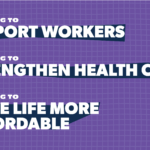
Canada’s unions step up pharmacare campaign this Labour Day
This Labour Day, Canada’s unions are calling on the federal government to get it right on pharmacare by creating a single-payer, universal prescription drug program for Canada.
Labour Day offers Canadians an important opportunity to reflect on the legacy of unions, to take stock of our progress and to commit ourselves to working together for a fairer future. Canada’s unions work to raise the standards for every worker, from higher wages and pensions, to better safety standards. This year, unions are working to improve the health of everyone in Canada by campaigning for universal pharmacare.
Since launching a national campaign on pharmacare last year, the Canadian Labour Congress has seen significant progress, including the creation of the Advisory Council on the Implementation of National Pharmacare by the federal government last spring.
“We’ve gained incredible momentum on pharmacare,” said Hassan Yussuff, CLC President. “We’ve been working closely with health coalitions, nurses unions, business groups, and a variety of medical professionals to start this overdue conversation in cities and towns right across the country. What we’ve heard time and again from Canadians is that pharmacare is the unfinished business of health care and it’s about time we get this done.”
Yussuff said that proposals by the insurance industry and Big Pharma won’t save Canadians, businesses or government money, but they will help increase those companies’ already high profits.
“More than 100,000 people across Canada have taken action to support universal pharmacare, and those numbers are growing daily,” said Yussuff. “We’ve said all along that patchwork coverage that varies from one province to another isn’t working for people in Canada, and a fill-in-the-gaps approach to pharmacare just isn’t good enough.”
The Advisory Council has launched both online and public consultations on pharmacare, and Canadians should take the opportunity to send their feedback to the government. Studies have consistently shown a majority of Canadians are struggling to afford to pay for their prescription medications, or worry about being able to afford it in the future.
“We’ve made great strides towards universal pharmacare in Canada. The government is listening, so now is our chance to get it right,” said Yussuff. “The right way forward – the only way that pharmacare will really work in Canada – is with a single-payer, universal program that covers everyone with a health card and delivers savings through bulk-buying.”
National pharmacare is both sound economic and social policy, that will have a positive impact on our communities,” Yussuff added.
For more information on the campaign visit aplanforeveryone.ca.








